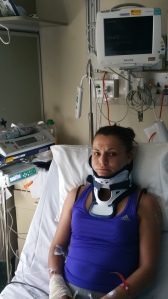Police have been accused of conducting an “unlawful home invasion” and illegally detaining a Canberra woman twice in one day.
The allegations were aired during evidence in a common assault case in the ACT Magistrates Court earlier this week, where defence barrister Steven Whybrow, instructed by Jane Carey of Ben Aulich & Associates, forcefully cross-examined an officer about an encounter with his client.
Police went to the O’Connor home of the 40 year old woman in November, after receiving reports from neighbours that she was having an argument about her five-year-old son with her mother.
When police arrived, there was no breach of the peace, the argument had finished, and there was no ongoing fear for the child’s safety. The woman, who has no criminal record, didn’t invite them in, and they didn’t have a warrant.
Police entered the home, and said the woman told them she had taken valium and alcohol and no longer had “anything to live for”.
Officers told the woman they were detaining her. Mr Whybrow alleged they made no further attempts to ascertain her mental state, or ask how many tablets she may have ingested.
A constable told the ACT Magistrates Court on Tuesday that police feared she may overdose or self-harm, and so emergency powers under the ACT’s Mental Health Act were used to immediately detain her.
Those powers are only to be used when police believe there is a risk of suicide, self-harm, or serious harm to others. Police are required to transfer the detainee to an “approved health facility” when using such powers. That did not occur.
The woman did not comply with attempts to detain her and after being followed through the home and “corralled” into a corner of her garage, she lashed out at an officer, slapping one with an open palm.
She was charged with common assault, but Mr Whybrow is arguing self-defence, claiming the act occurred in the face of illegal behaviour by police.
Despite police’s apparent fears of an overdose, the woman was taken to the ACT Watch House, not the hospital, where she allegedly waited for 30 minutes before a doctor was called.
The officers who attended her home are thought to have made no checks with police operations about her mental health history, asked no questions about the number of valium tablets ingested, and made no contact with the ACT Mental Health’s Crisis Assessment and Treatment Team.
As part of new measures introduced in recent years, police have immediate access to mental health clinicians and records through their operations centre.
One constable, who was at the scene, told the court police only used the mental health information if “you’ve got the time”.
“It’s something that can be done. It’s not something that has to be done.”
The woman was transferred to the hospital from the ACT Watch House. Once at the hospital, she was no longer deemed to be “in custody”, so she left before mental health workers could assess her.
Upon learning of her exit from hospital, police drove to her home and watched her arrive in a taxi.
They then told her she was under arrest, again, this time taking her directly to hospital because of concerns for her safety.
Mr Whybrow asked:
“What concerns?”
The officer replied:
“She had taken alcohol and valium and said she had nothing left to live for. I’d say that’s fairly serious.”
Mr Whybrow replied:
“So serious that you don’t even have anyone take her to the hospital [the first time]?”
Mr Whybrow described her imprisonment as “totally unlawful” and police actions as an “unlawful home invasion”.
Earlier, the barrister told the court that records that should have been filled out to justify the use of the emergency mental health powers appeared not to exist.
He expressed concern that they may suddenly appear before the next hearing date.
Special Magistrate Ken Cush said there should be further discussions made between the parties about the continuance of the case.
Mr Cush said prosecutors had a duty to decide whether it was in the interests of justice to proceed with the charge.
He said even if evidence was not excluded, and the case against the woman proved, he would likely give her a non-conviction order for the minor charge of common assault, given her lack of criminal history.
The matter will return to the ACT Magistrates Court next month.
Credit: Christopher Knaus, Canberra Times




